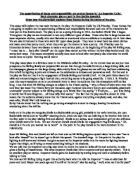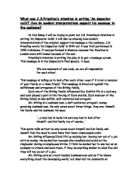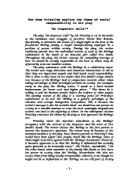The apportioning of blame and responsibility are central themes in 'An Inspector Calls'. Each character plays a part in Eva Smiths downfall. Show how the playwright explores these themes during the course of the play.
The apportioning of blame and responsibility are central themes in 'An Inspector Calls'. Each character plays a part in Eva Smiths downfall. Show how the playwright explores these themes during the course of the play. This essay will explore the two main themes in the play 'An Inspector Calls' by J.B.Priestley. These themes that I am going to explore are the apportioning of blame and responsibility between each one of the characters for their part in Eva Smiths death. The play is set on a spring Evening in 1912, Just before World War 1 began. Throughout the play we are introduced to two very different types of class. Those who live in large houses and wear expensive clothes, usually who own factories or stocks and who are oblivious to anybody not in their class. We are also introduced to those who work for upper-class people. They have to wear hand-me-down clothes and make every last penny count, when they even get the chance to have a penny. J.B. Priestley uses the interaction between these two classes to make a very serious point, at the beginning of the play Mr Birling says, " a man has to ... look after himself" yet the upper class cannot survive without the low class workers and this works both ways. This means everybody actually does need to look after everybody else otherwise the world would have no cycle! Nothing would work! This play takes place in a
Questions and Answers on "An Inspector Calls"
. What do we learn about each of the characters on stage in the opening stage directions? How might the actors show that the characters and pleased with themselves? In the opening stage direction we learn that four members compose the Birling's family. This family has a maid, called Edna. Arthur Birling is Sheila and Eric's father. He is a heavy-looking, rather portentous man in his middle fifties with fairly easy manners but rather provincial in his speech. Sybil, his wife, is about fifty and is rather a cold woman and her husband's social superior; and is the daughter of a more important family. Her daughter, Sheila, is a pretty girl in her early twenties, very pleased with life and rather excited. Her brother, Eric, is also in his early twenties, not quite at ease, half shy, half assertive. Also in this stage direction it is presented Sheila's fiancé, Gerald Croft, who is described as an attractive chap about thirty, rather too manly to be a dandy but very much that easy well-bred young man-about-town. 2. What tone is set in the opening exchanges between the characters? The tone set in the opening exchanges between the characters seems to be warm and kind. The whole family is celebrating a special ocassion, the engagement between Sheila Birling and Gerald Croft. 3. What does Sheila's engagement to Gerald mean to Arthur Birling? Sheila's engagement to Gerald means a
EVA Smith's DIARY ENTRIES
EVA Smith's DIARY ENTRIES Tuesday, September 19th, 1910. Im shattered today. It was another hard day at the Works. The weather's getting worse and the prospect of a pay rise is the only thing keeping me going, at the moment. However, I'm not that optimistic of achieving it. Birling is an ignorant, obstinate, old fool and is adamant on widening the gap between rich and poor. Tomorrow's the day he's going to discuss our offer. It's a lost cause. I've always fought for what I believe in but know I'm beginning to wonder what the point is. This job is the only thing I've got and I can't afford to lose it. People nowadays don't take kindly to single girls who are unemployed and have no prospects. Anyway that's enough for tonight, I better hit the sack. Wednesday September 20th 1910, It turned out that Birling didn't want to negotiate at all! He sacked me! Typical! Just when I thought I was on the verge of a promotion, this happens! He work's us like slaves and isn't even willing to negotiate a compromise. It just isn't right. The world would be a much better place without scum like Birling. He gave us a load of old waffle about how he didn't want to drive labour costs too high and in his words, "regrettably we are going to have to discharge you." The slimy, good for nothing, weasel, he made it sound as if he had no choice. Well I suppose there's no point wallowing
An Inspector calls - Sheila and Mr. Birling.
An Inspector calls Sheila and Mr. Birling have very different characteristics. Sheila, being a much younger person is quite impressionable, whereas Mr. Birling is not he believes in the solid way of what he thinks is right must go ideas. Sheila attitude and views change as the as the inspector goes on, while Mr Birling refuses to change what he thinks altogether. Their differences in characteristics are shown in their reactions to Eva death, told by the inspector as he goes through all the suspects the Birling family and the Gerald and to each other. Mr. Birling is the father of Sheila Birling and considers himself of having a very high status in society. He is a self made man, being prosperous factory owner, a local magistrate and ex-Lord Mayor of Brumley. He regards himself as being reasonable and what he sees fit as being fair. His first priority is to make money it my duty to keep labour costs down and he pays his employees no more than the going rate. However, as the story continues, we are shown how Sheila sees her father being a stubborn businessman and thoughtless. Sheila on the other hand is shown as being young, attractive, sensitive and straightforward character. She is one of the very few characters in the play that is impressionable, and acutely affected by what the Inspector reveals about her family through the story. Mr Birling and Sheila's characters are
How does Priestley create dramatic tension in Act 1 of An Inspector Calls up until the arrival of Inspector Goole?
How does Priestley create dramatic tension in Act 1 of 'An Inspector Calls' up until the arrival of Inspector Goole? 'An Inspector Calls' is a play written by J.B Priestley in 1945. Its genre is a modern detective thriller combined with a medieval morality play. J.B Priestley was an English dramatist who is recognized for writing over 50 plays; An Inspector Calls is one of his most infamous. Many plays that Priestley has written reflect his political views. He was a socialist, and was very concerned with the amount of inequality in Britain at the time. Priestley wrote 'An Inspector Calls' with the intention of conveying the idea of social discrimination to the audience through ridiculing and showing the attitude of the capitalist Birling family. Priestley deliberately set the play in 1912, although it was written in 1945. He did this because in 1912 everything was exceedingly different to the era he was writing it in. When the play was set, there were strong distinctions between gender, class and sex; whereas when the play was written those distinctions had been significantly reduced, mainly because of World War One. Priestley wanted to make the most out of those changes in the play, to make people seize the opportunity to build a more caring and equal society. Priestley creates dramatic tension throughout Act One, up until the Inspector arrives. The first few
Discuss the way Sheila and Gerald's relationship evolves through the play. What hope do you think there is for their future happiness together?
An Inspector Calls By J.B. Priestley Discuss the way Sheila and Gerald's relationship evolves through the play. What hope do you think there is for their future happiness together? At the start of the play, Sheila and Gerald have known each other for about a year, and they are celebrating their engagement. Sheila is in her early twenties, and Gerald is about thirty. Gerald comes from a rich, powerful, well-respected family, and his father is Sir George Croft: a rich business owner. It appears as if Sheila's family encourages their relationship because Mr Birling and Sir Croft are business rivals, and Mr Birling thinks it would benefit his business to be linked with the Crofts. He thinks he would make money from it, and money is very important to him. He says 'Crofts and Birlings...working together for lower costs and higher prices.' He also says 'You're just the kind of son-in-law I always wanted' to Gerald. At the beginning of the play, Sheila and Gerald's relationship is unbalanced because Gerald sees himself as the dominant one, and he is controlling. Sheila is naïve, quite immature for her age, and impressionable. Gerald chose and bought the engagement ring for Sheila, without her having any say about it, and she just accepts that, and doesn't question Gerald. She says 'Is this the one you wanted me to have?' which shows her willingness to be controlled. Also, when
Explore the way the characters between different generations is developed in An Inspector Calls
Explore the way the characters between different generations is developed in An Inspector Calls In the play An Inspector Calls, written in 1946 by Mr J.B Priestley, there are two contrasting generations, the old and new. These characters are developed as the play unfolds. The play is set before World War 1, in 1912. This period was drastically different to the one in which it was written, 1946, with the social classes being much farther apart and the welfare state being non-existent. In this essay I will look at how the characters Sheila and Arthur Birling change over the course of the play, and how the generation gap affects this. These characters have been chosen because they, in my opinion, differ the most out of any two characters in the play. I will firstly look at how Sheila is portrayed when we first meet her at the start of the play. In the first act the Birling family is having dinner to celebrate Sheila marrying Gerald Croft, a lucrative decision for both of the families. Sheila is shown as sarcastic and playful when she says “(with mock aggressiveness) Go on Gerald- just you object!” This sentence implies that Sheila likes to joke around with Gerald, which was actually in contrast to how women were supposed to act in that period, showing early on that she is also quite rebellious. The word “mock” means, in this case, means fake and not serious, reflecting
How does the character Sheila Birlings change in the play An Inspector Calls?
How does the character "Sheila Birling's" change in the play 'An Inspector Calls'? The play 'An Inspector Calls' was written in 1945 by J.B. Priestly, but it was set in 1912. At this time society was capitalist, there were very strong distinctions between upper and lower class people, industry and agriculture were privately owned and wealth was not shared equally. The play centers on the Birling family headed by Arthur Birling who is a wealthy factory owner. At the start of the play the Birling family is celebrating happily Sheila's engagement to Gerald Croft. However, the mood changes when Inspector Goole arrives and informs them about the suicide of a young woman named Eva Smith. Sheila Birling is the daughter of Mr. and Mrs. Birling is described at the start as "a pretty girl in her early twenties, very pleased with life and rather excited", most probably because of her engagement to Gerald Croft. Her hopes and plans for the future are to have a happy married life with her husband-to-be. Early in the play her mother informs her about married life claiming that men "spend nearly all their time and energy on business". However, Sheila does not agree and she warns Gerald, "so you be careful", which shows that she wants her fiancé to be attentive towards her. When we meet Sheila she seems to be satisfied with life; she is also from a comfortable family and so is Gerald.
What was J.B.Priestley's intention in writing 'An inspector calls'? How do modern interpretations support his message to the audience?
What was J.B.Priestley's intention in writing 'An inspector calls'? How do modern interpretations support his message to the audience? In this Essay I will be trying to point out J.B. Priestley's intention in writing 'An Inspector Calls'. I will also be showing how modern interpretations of the original, support his message o the audience. J.B. Priestley wrote 'An Inspector Calls' in 1944 but it was first performed in 1945 in Moscow. It was performed in Moscow because the theatres in London were still closed because of the war. Priestley's intention in writing the play is to get a message across. This message is in the Inspector's final speech, it says, 'We are members of one body, we are all responsible for each other'. This message is telling us to look after each other, even if it is not a member of your family or a close friend. This message is stood out against the selfishness and arrogance of the Birling family. Each one of the Birling family influenced Eva Smith's life in a bad way and each played a part in the forcing of Eva's suicide. Each member of the Birling family is also selfish, self-centered and arrogant. Mr. Birling is a business man, a self-centered, arrogant, money grabbing business man. He only cares about three things, they are; himself, his family and his business. He says, '...a man has to make his own way-has to look after himself- and his
How does priestly make 'an inspector calls' a dramatic play?
How does priestly make 'an inspector calls' a dramatic play? Priestly uses a variety of methods and techniques to make 'an inspector calls' a dramatic play. He includes dramatic irony, tension and suspense to create a dramatic atmosphere. The whole play is set in one room with no lapses of time. This in itself creates tension and also represents the Birling family's separation from the outside world. Priestly creates an uncomfortable atmosphere from the stage directions at the very beginning of the play. "The lighting should be pink and intimate until the inspector arrives. And then it should be brighter and harder." Priestly wants to show to the audience the difference in mood when the inspector arrives. It creates dramatic tension. Tension building is also used during act 1 when the Inspector will only show the photograph to Mr Birling. "Any particular reason why I shouldn't see this girl's photograph, Inspector?" This is dramatic because the characters and the audience are not sure whether to trust the inspector. They are questioning his reasoning. Dramatic irony is used to reveal Mr Birling's character in Act1. "Some people say that war is inevitable. To that I say fiddlesticks." Judging from when the play was written and when it was set, it is clear to the audience that Priestly is showing Mr Birling to be an ignorant man who is soon to be proven wrong in his



















